Clustering Delivery and Assessment 6 March 2025, 5:30pm – 6:30pm, AEDT, Online Summary In this presentation, Frances La Riccia unpacked the process she and her Melbourne Polytechnic colleagues use to...
Meet the Assessors Online 2025 13 February 2025, 4:30pm – 6:00pm, AEDT, Online Summary The VCAA Chief Assessor for VCE EAL, Jenna Gomes, and Deputy Chief Assessors, Linda Hogan and...
2024 VicTESOL Symposium – Keynote Session: Refugee education in Australia: what helps, what hinders and what needs to change
11 November 2024, 4:30pm – 5:30pm
Summary
VicTESOL were very pleased to have Dr Melanie Baak present the key note address for the 2024 symposium, which set the scene for the rest of the symposium events. Melanie presented on a significant body of research looking at how schools foster resilience for students from refugee backgrounds. She presented key learnings and information that resonated with the experiences of attendees. Melanie’s insights were very thought provoking, which generated lively discussions between attendees in break out room sessions and led nicely to the next programmed event – hearing the experiences of young people of refugee backgrounds in Victorian schools.
Recording
Resources
2024 VicTESOL Symposium – Workshop: Impacts of Trauma on Learning and Behaviour
20 November 2024, 4:30pm – 6:00pm
Summary
In this session, Lindsey Hogg, Professional Learning Officer, and Allison Greene, Lead and GROWTH Coach, from Foundation House Schools Support Program presented a session on Foundation House’s Recovery Model. This session unpacked practical and developmentally appropriate support strategies for learners’ impacted by trauma. The session emphasized the importance of trauma informed practice when working with learners from refugee or refugee like background and the importance of creating safe and culturally responsive learning environments that empower and promote the establishment of safe and nurturing relationships.
For More information of Foundation House Recovery Model or Refugee Education Support Program or wellbeing services for education sites contact: (03) 9389 8900
School support: https://foundationhouse.org.au/specialised-programs/schools/
Referral Support: https://foundationhouse.org.au/for-clients/make-a-referral/
Recording
Recording to come
Resources used in the session
Other Resources
2024 VicTESOL Symposium – Panel Discussion
18 November 2024, 4:30pm – 5:30pm
Summary
This panel was held in response to symposium keynote address by Melanie Baak, Refugee education in Australia: what helps, what hinders and what needs to change. The Pannel was facilitated by Victesol committee member, April Edwards. Pannel members from a range of settings including school leadership and refugee support services discuss their experiences of working with students from a refugee background. This included the teaching of English as Additional Language, creating welcoming and inclusive social environments, supporting pathways and supporting wellbeing. The Pannel discussed ways schools can be culturally responsive and importance of supporting wellbeing and being aware of challenges faced within the settlement process and establishment of new lives and identities.
Panelists:
Sarah Cunningham has been employed with CatholicCare Victoria since 2020, coordinating a Job Readiness Program for refugee youth and their mothers in Geelong’s Northern Suburbs.
Debra Gibson is the Principal of Doveton College – a vibrant learning community comprising an Early Learning Centre for children 0-5 years of age, school for Foundation to Year 9 and a range of adult learning classes.
Christine Bakopanos is a Counsellor-Advocate Senior Practitioner at The Victorian Foundation for Survivors of Torture- known as Foundation House. Foundation House provides a range of services to people from refugee and asylum-seeker backgrounds who have survived torture or war related trauma.
Houda El Kheir has been working as a Multicultural Education Aide at Meadows Primary School, in Melbourne’s north for the last 5 years. She works closely with teachers, the principal and the wellbeing team in supporting newly arrived and refugee families to navigate the Australian schooling system.
Recording
2024 VicTESOL Symposium – Pre-recorded Interviews: The Experiences of Students from Refugee Backgrounds
13 November 2024, 4:30pm – 5:30pm
Summary
Summary to come
Resources
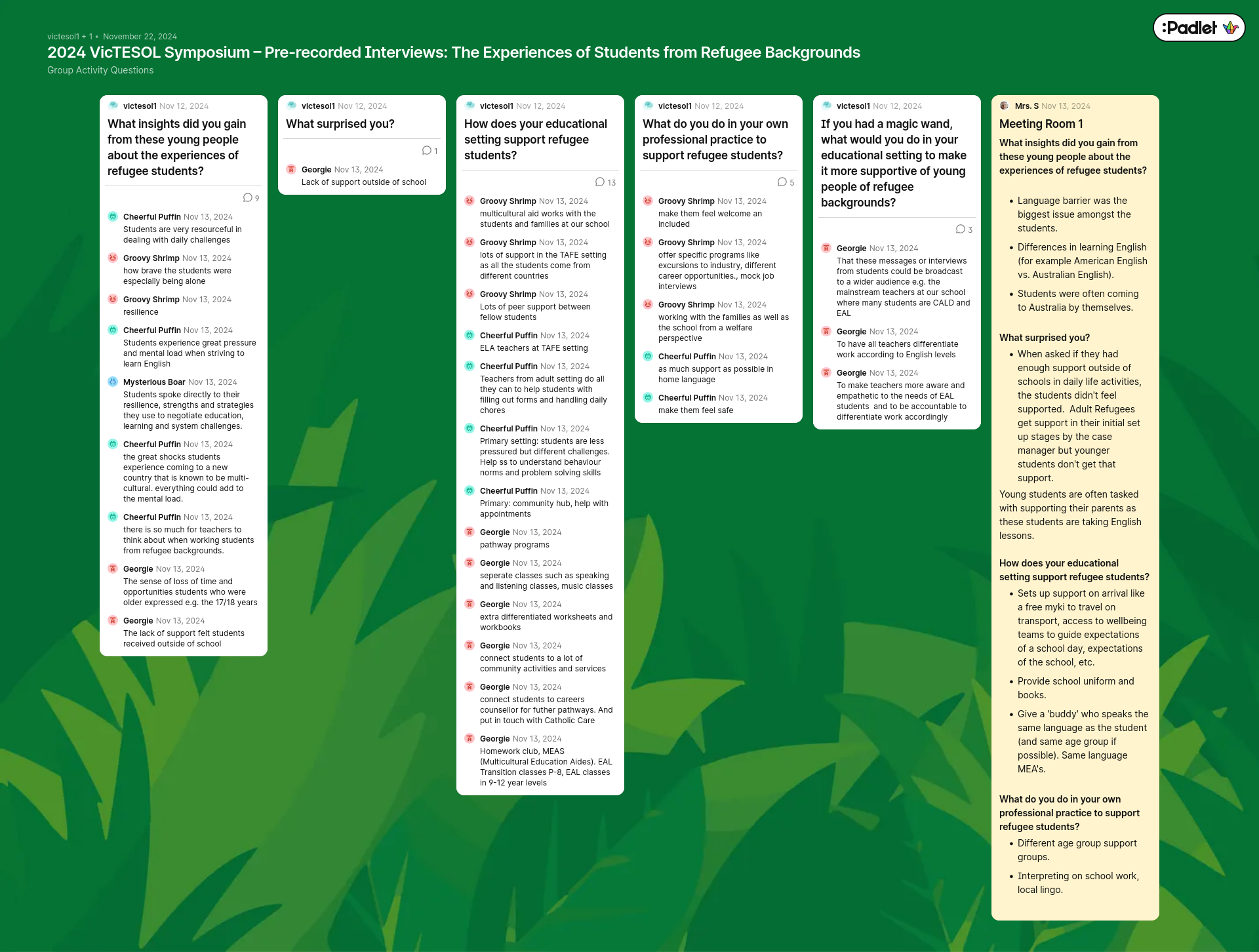
Immigration Museum and Podcast Launch
October 17 from 4:30 pm – 6:00pm
Summary
On October 17, VicTESOL hosted an engaging educator’s tour at the Immigration Museum, offering both professional development and an opportunity to explore some of the museum’s latest exhibitions. The evening began with a chance for participants to connect over a selection of tea, coffee and delicious food platters, providing a relaxed atmosphere to chat and network.
Immigration Museum educator Gurmeet Kaur then presented some of the updated resources and educational programs for students visiting the museum. Her insights gave attendees fresh ideas on how to incorporate the museum’s diverse resources and themes into classroom learning. Following this, we heard from Dr. Katrina Tour and A/P Melissa Barnes who officially launched the Voices in TESOL podcast series. The podcast promises to be an invaluable resource for educators in the TESOL community and was a highlight of the evening!
After the presentations, educators had the chance to explore the museum’s exhibitions. The Joy exhibit was a standout, featuring vibrant artworks by Australian artists and interactive elements, including a playful oversized soft bunny and a “Share Your Joy” wall where visitors can reflect on what sparks joy in their own lives. The Videoland exhibit, filled with 90s nostalgia, also provided a fun walk down memory lane! Attendees agreed that the event was a great success and are looking forward to incorporating some of the ideas back in their educational settings.
Resources
- Link to VicTESOL’s Spotify Podcast
- Link to Immigration Museum’s schools and Resources Page
- Link Immigration Museum’s Joy exhibition
Photos from the session
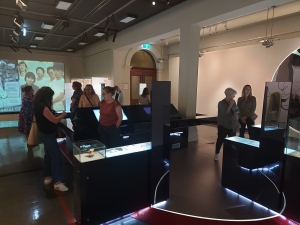
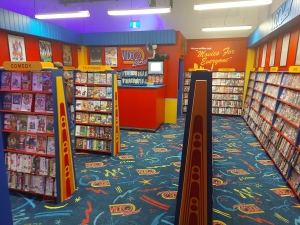
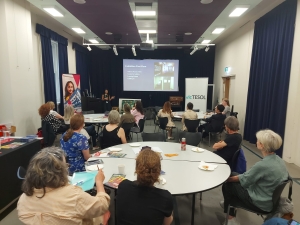
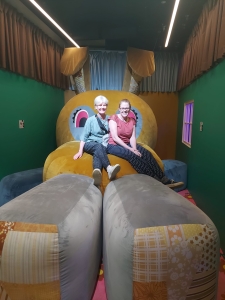
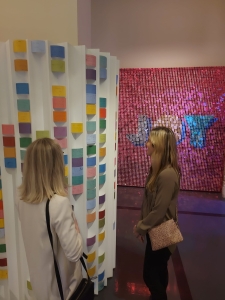


Metacognition and EAL Teaching
September 17 from 4:30 pm – 5:30 p
Summary
In this online presentation, Dr Lilly Yazdanpanah discussed the importance of metacognitive thinking for both EAL teachers and students. Dr Yazdanpanah provided participants with a clear definition of both cognition and metacognition and spoke of the benefits to teachers who make space in their teaching, to engage in the reflective practice of systemically considering how their students best learn. Through metacognitive thinking, teachers can become more intentional in their practice, and foster a deeper understanding of their students’ learning experiences.
Additionally, Dr Yazdanpanah emphasized the benefits of teaching metacognitive strategies to students and modelling reflective thinking in the classroom. By demonstrating how to think about their own learning, teachers can guide students to plan for, monitor and evaluate their learning. During the session, practical examples were shared to illustrate these strategies in action. Through explicitly supporting EAL students to consider the ‘what’, ‘how’, ‘why’ and ‘when’ of their learning, Dr Yazdanpanah demonstrated that EAL students can become more empowered learners.
Resources
What Grammatical Knowledge is Powerful for Specialist Language Teachers?
September 10 from 5:30 pm – 6:30 pm
Summary
On 10 September, we were pleased to have Dr Chris Corbel present the third in his series of webinars for VicTESOL. This webinar focussed on powerful grammatical knowledge for specialist language teachers. Chris first briefly outlined the concept of powerful knowledge. He then explained two types of powerful grammatical knowledge relevant for specialist language teachers:
- Grammatical know-how – procedural knowledge, the skill of ‘grammaring’. This means the ability to apply grammatical constructions for communicative purposes, to teach grammatical constructions for communicative purposes and to learn about grammatical constructions.
- Grammatical know-that – propositional knowledge, threshold concepts. This means understanding the core concepts that underpin grammar, not mastery of the details.
This session provided lots of grammatical food for thought for both beginner teachers and experienced EAL teachers.
Recording
Resources
“Eye-opening”: How we can use multimodal texts with school staff to support more inclusive school and classroom narratives
September 5 from 5:00 pm – 6:00 pm
Summary
In this professional learning session, Ms April Edwards, a Teaching Specialist in English and Literacy Education at the University of Melbourne, led an online session on the role of multimodal texts in promoting inclusivity within schools. This session delved into plurilingualism and multilingual teaching approaches that benefit EAL/D (English as an Additional Language and dialect) students. Key concepts discussed include “Language Interdependence Hypothesis,” which highlights the interconnected nature of students’ language learning across their linguistic repertoires.
This session inspired participating EAL teachers by validating multilingualism, encouraging pride in students’ home languages, and offering practical strategies such as language timelines to incorporate students’ diverse linguistic backgrounds into lessons. It also showcased the impact of recognizing students’ language skills, prompting teachers to reflect on and enhance their own language-inclusive practices.
Attendees were grateful for the learning opportunity and were given the chance to share their own personal and professional experiences.
VicTESOL would like to thank April for generously sharing her knowledge and experience and for her valuable contribution to the VicTESOL professional learning community.
Recording
Resources
ry to come

